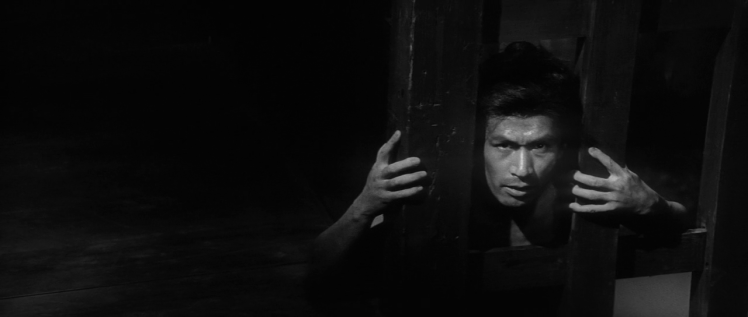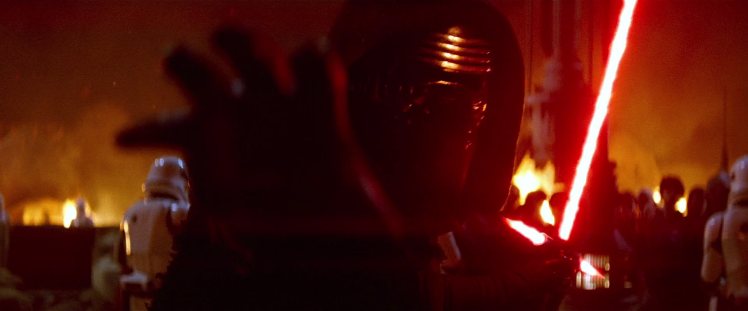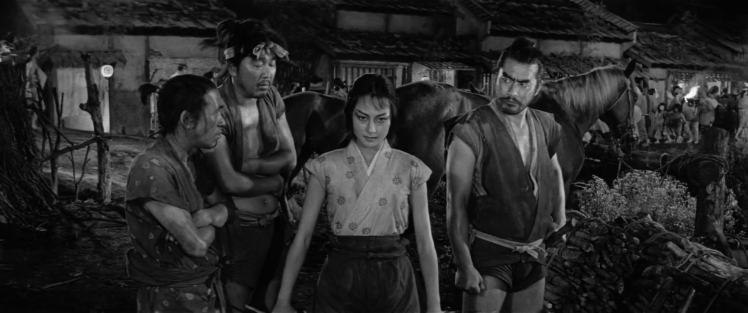
Three Outlaw Samurai (1964)
Three Outlaw Samurai is another film name-dropped by Rian Johnson at the Future Filmmakers panel at Celebration Europe, and of all the titles mentioned this was the one that leaped out to me as the most intriguing. A 1964 chambara film, Three Outlaw Samurai is the debut feature of Hideo Gosha. The central figure of the film is Sakon Shiba, a wandering ronin who comes across three peasants who have kidnapped the daughter of the local magistrate in the hope of coercing him to lower taxes. Sympathetic to their plight, Shiba decides to help them, but in doing so he precipitates a series of events that result in his faith in the systems of honour and law being shattered.
Now, it is safe to say that Star Wars: Episode VIII is unlikely to concern tax disputes (ground already amply covered by the prequel trilogy). Indeed, as with almost all the films mentioned at the Future Filmmakers panel, the influence of Three Outlaw Samurai is most likely to be thematic and/or visual. To break it down, I can detect the following themes:
– Loss of faith in established systems of order, honour and justice.
– The fundamental cruelty and senselessness of the class system.
– Relationships taking radical and surprising 180-degree turns.
The most striking element of the film (and the one I will focus on here – the others will have to wait) was the disintegration of Shiba’s faith in external sources of morality, justice and social order. By the end of the film, he is disgusted not only by the corrupt magistrate, but also by the cowardice and inaction of the peasants themselves. The three peasants who kidnapped the magistrate’s daughter have already been murdered, in an act that saw the magistrate break his solemn vow to Shiba that they would not be harmed, and those they were trying to help are too afraid to act even when they are handed the petition that their friends died for. The systems ordering society – be they judicial, moral or honour-based – are proven hollow. By the close of the film, the samurai of the title only have their own consciences left to guide them. They are lawless, but only because the law demonstrably doesn’t deserve their respect.
Almost everyone in the film betrays someone – you have a daughter defying her father by helping the man who kidnapped her, a samurai ignoring his solemn vow by ordering the deaths of the peasants he swore to pardon, a father forsaking his daughter by selling her to a brothel, a woman betraying her vow to kill her husband’s murderer by agreeing to run away with the killer, a samurai betraying his friends to be with the woman he loves, etc., etc. These betrayals are motivated by many different forces, and adequately representing them would take the mother of all Venn diagrams. (So let’s just say I pass on that – watch the film!)
I don’t see any of these specific themes making it into Episode VIII, but I do see the general idea of betrayal playing heavily into the story. One of the main reasons for believing this is that Episode V, the middle film of the original trilogy, is also very much about betrayals – Luke betrays his duty to train as a Jedi, Lando betrays the trust of his friends, and Darth Vader betrays every fatherly duty conceivable when he chops his own son’s hand off and leaves him a miserable, snivelling wreck who chooses likely death over an evil father/son double act. More specifically, I can also see the idea of betrayal playing into things on a macro level – whereas the betrayals of The Empire Strikes Back were all very personal and intimate (being between friends and family members), I envisage the betrayals of Episode VIII being betrayals of values, beliefs and systems of order.

Kylo Ren on crusade
Why do I think this? Well, the primary reason would be that Kylo Ren, as he is presented in The Force Awakens, is a fanatical ideologue. As Kylo sees it, he is a crusading knight on a noble and essential mission to purge the galaxy of the Jedi and their sympathisers. He is honour bound to compensate for the mistakes of his grandfather and “finish what he started”. He experiences this responsibility as an unbearable weight on his shoulders, and openly struggles with what he has come to perceive as his ultimate destiny.
Kylo clearly places immense faith in a tenuous system of abstractions. He tentatively trusts Snoke and wants to believe in his promises of the power and glory of the dark side. He chooses to believe that killing his father will bring him the power and stability he seeks, but when he commits the act he is “horrified” (as per the script). In the aftermath of the act, he seems weakened rather than strengthened – his strategy is nonexistent, his behaviour is erratic, and his loyalties are most striking in their absence. But, of course, The Force Awakensends with Kylo being ignominiously dragged back to Snoke. As much as the prospect might have appealed to Kylo in those final moments on Starkiller Base, there is no chance of him going ronin because his master proves efficient in scooping him up and restoring him to the evil fold.
So, in The Force Awakens you already have a profoundly ideological (and, in a perverse way, honour bound) character whose beliefs are tested to the extreme. That, in my view, leaves two possibilities for Kylo Ren going forward – his doubts are resolved as he completes his training under Snoke, and he fully commits himself to the dark side; or his doubts persist and grow, and his certainties are eroded still further over the course of Episode VIII.

The Hidden Fortress (1958)
The influences of samurai films – and Kuroawa’s filmography (The Hidden Fortress, in particular) – on the original trilogy are well documented. In those films, the Jedi were clearly analogous to the samurai, being bound by a code of honour and a careful system of discipline. This was manifest by Obi-Wan Kenobi in A New Hope, a figure who embodied the values of Jedi knighthood and taught Luke the ways of the Force. In light of this, the very absence of the Jedi and their teachings is probably one of the most striking elements of The Force Awakens. We meet Maz, who speaks of the Force and its ways, but she is a mere proxy – “no Jedi”, she cannot teach or guide Rey as Obi-Wan could teach and guide Luke. In the absence of any Jedi training or structuring system, then, we only have the dark side equivalent in the triptych of Snoke, Kylo Ren and General Hux. There is no Jedi code on display, but it is clear that Kylo is following some kind of dark side equivalent. So, in the sequel trilogy we almost have an inversion of the original trilogy in that we have dark side ‘samurai’ (after a fashion) and the young Skywalker dashing hopes instead of restoring them.
And then, of course, there is the elephant in the room – the biggest betrayal ofThe Force Awakens (besides Han’s murder) occurred in the past, when Ben Solo betrayed his uncle and “destroyed” his work to rebuild the Jedi Order. While I certainly don’t expect to see this explained away as a heroic deed following the example of Three Outlaw Samurai (where betrayal is, under certain circumstances, shown to be honourable and commendable), I would be unsurprised to see it being presented as a decision motivated by a ‘crisis of faith’ that saw Ben Solo’s faith in the Jedi irrevocably shattered.
So, with all that blather out of the way, let’s get to predictions!
1. Kylo’s betrayal of his uncle was, to a large degree, ideologically motivated, following some kind of crisis of faith or the discovery of evidence suggesting that the Jedi were inherently corrupt or dangerous.
2. Kylo’s new ordering system for the dark side will be challenged as his old one for the light side was. This is likely to cause some kind of psychological crisis or loss of faith.
3. There is likely to be betrayal at work in other quarters, though this is likely to be betrayal of a more personal nature (think Lando in ESB-level betrayal).
These predictions are dangerously specific (much more specific than those featured in my Letter Never Sent blog, for example) and may be entirely off-base. For all I know, Rian may just be modelling lightsaber battles on Gosha’s sweet, sweet fight choreography. Whatever the case, Three Outlaw Samurai is a great touchstone for any film to reference and I recommend it highly (accept nothing less than the Criterion transfer – you owe it to yourself).
I think…okay, I’m probably completely wrong but here we go.
I think Kylo will lose his faith in both Snoke and the First Order. The rot has already begun to set in; he was led to believe the murder of his father would free him from his ability to feel – an end to the constant psychological pain. Instead it had precisely the opposite effect.
I think Rey will learn something that will destroy her faith in the rebellion.
Some spoilers mentioned Finn falling in love and the object of his affection betraying him…perhaps he will lose his faith in romantic love.
And other spoilers had Laura Dern as a Resistance officer who has a falling out with Poe…perhaps Poe will lose his faith in the Resistance.
I have a feeling that our quartet of main characters will end up losing faith in what they believe in. And the result might be the breaking of them…or the making.
But…I’m probably completely wrong!!
In any case, I would rather like to see the Resistance as not whiter than white characters; we’ve already seen the ‘human’ side of the First Order through Finn, maybe now we’ll see the ‘dark’ side of the Resistance. It would be an interesting twist on the old tales.
LikeLiked by 1 person
Totally agree with Redrascal1. I remember reading somewhere that the characters would be tested, and I think that a test of their faith in what they are doing would be the ultimate test– more so than a test of their abilities. Kylo, as stated above, has already started falling– in fact, given what Hux says about his personal interests, I think he was like that before the events of the film even started. Great post, and the film sounds very interesting.
LikeLike